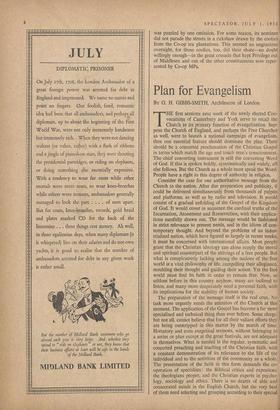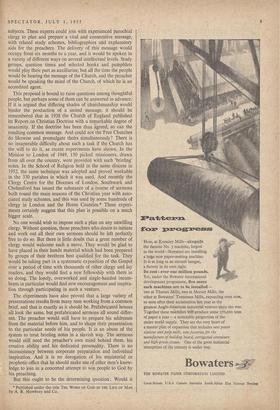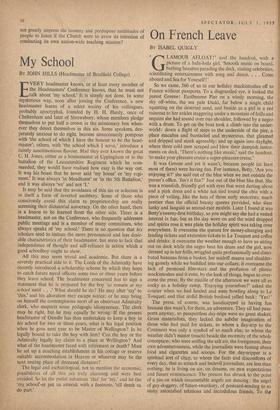Plan for Evangelism
BY 0. H. GIBBS-SMITH, Archdeacon of London THE first sessions next week of the newly elected Con- vocations of Canterbury and York serve to recall the Church to its primary function of evangelisation. Sup- pose the Church of England, and perhaps the Free Churches as well, were to launch a national campaign of evangelism, then one essential feature should dominate the plan. There should be a concerted proclamation of the Christian Gospel in terms which match the age and touch man's consciousness. The chief converting instrument is still the converting Word of God. if this is spoken boldly, systematically and widely, all else follows. But the Church as a whole must speak the Word. People have a right to this degree of authority in religion.
Consider the case for one authoritative message from the Church to the nation. After due preparation and publicity, it could be delivered simultaneously from thousands of pulpits and platforms, as well as by radio and television. It would consist of a gradual unfolding of the Gospel of the Kingdom of God. It would cover in sequence the cardinal truths of the Incarnation, Atonement and Resurrection, with their applica- tions carefully drawn out. The message would be fashioned in strict relevance to present needs, and in the idiom of con- temporary thought. And beyond the problems of an indus- trialised nation, which have figured so largely in recent weeks, it must be concerned with international affairs. Most people grant that the Christian ideology can alone supply the moral , and spiritual counterpart of the strivings of a free people. But what is conspicuously lacking among the nations of the free world is a vital philosophy of life, compelling their allegiance, moulding their thought and guiding their action. Yet the free world must find its faith in order to remain free. Now, as seldom before in this country anyhow. many are inclined to listen, and many more desperately need a personal faith, with its implications for the stability of human society.
The preparation of the message itself is the real crux. No task more urgently needs the attention of the Church at this' moment. The application of the Gospel has become a far more specialised and technical thing than ever before. Some clergy, but not all, cannot believe that for all their valiant efforts they are being outstripped in this matter by the march of time. Hortatory and even exegetical sermons, without belonging to a series or plan except at the great festivals, are not adequate in themselves. What is needed is the regular, systematic and concerted preaching and teaching of the Christian faith, with a constant demonstration of its relevance to the life of the individual and to the activities of the community as a whole. The presentation of the faith in this form demands the co- operation of specialists : the Biblical critics and expositors. the theologians proper, and the Christian experts in psycho- logy, sociology and ethics. There is no dearth of able and consecrated minds in the English Church, but the very best of them need selecting and grouping according to their special subjects. These experts could join with experienced parochial clergy to plan and prepare' a vital and consecutive message, with related study schemes, bibliographies and explanatory aids for the preachers. The delivery of this message would occupy from six months to a year, and it would be spoken in a variety of different ways on several intellectual levels. Study groups, question times and selected books and pamphlets would play their part as auxiliaries; but all the time the people would be hearing the message of the Church, and the preacher would be speaking the mind of the Church, of which he is an accredited agent.
This proposal is bound to raise questions among thoughtful people, but perhaps some of them can be answered in advance. If it is argued that differing shades of churchmanship would hinder the production of a united message, it should be remembered that in 1938 the Church of England published its Report, on Christian Doctrine with a remarkable degree of unanimity. If the doctrine has been thus agreed, so can the resulting common message. And could not the Free Churches do likewise and promulgate theirs simultaneously? There is no insuperable difficulty about such a task if the Church has the will to do it, as recent experiments have shown. In the Mission to London of 1949, 150 picked missioners, drawn from all over the country, were provided with such 'briefing' notes. In the School of Religion held in the same diocese in 1952, the same technique was adopted and proved workable in the 330 parishes in which it was used. And recently the Clergy Centre for the Dioceses of London, Southwark and Chelmsford has issued the substance of a course of sermons built round the main seasons of the Christian year with asso- ciated study schemes, and this was used by some hundreds of clergy in London and the Home Counties.* These experi- ments certainly suggest that this plan is possible on a much bigger scale.
No one would wish to impose such a plan on any unwilling clergy. Without question, those preachers who desire to initiate and work out all their own sermons should be left perfectly free to do so. But there is little doubt that a great number of clergy would welcome such a move. They would be glad to have placed in their hands material which had been prepared by groups of their brethren best qualified for the task. They would be taking part in a systematic exposition of the Gospel over a period of time with thousands of other clergy and lay readers, and they would find a new fellowship with them in so doing. The lonely, overworked and single-handed incum- bents in particular would find new encouragement and inspira- tion through 'participating in such a venture.
The experiments have also proved that a large variety of presentations results from many men working from a common brief, and that is exactly as it should be. Prefabricated houses all look the same, but prefabricated sermons all sound differ- ent. The preacher would still have to prepare his addresses from the material before him, and to shape their presentation to the particular needs of his people. It is an abuse of the system to treat briefing notes in a slavish way. The sermons would still need the preacher's own mind behind theni, his creative ability and his dedicated personality. There is no inconsistency between corporate preparation and individual inspiration. And it is no derogation of his ministerial or prophetic office that he should make use of other men's know- ledge to join in a concerted attempt to win people to God by his preaching.
But this ought to be the determining question : Would it * Published under the title THE WORD OF GOD IN THE LIFE OF MAN by A. R. Mowbray and Co. not greatly impress the country and predispose multitudes of people to listen if the Church were to avow its intention of conducting its own nation-wide teaching mission?
















































 Previous page
Previous page